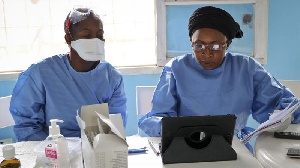A GNA Feature by William Dodzi Ezah
Accra, Aug. 20, GNA - Viewed against the backdrop that 80 per cent of those who contract HIV/AIDS in the country do so through sex, anyone with enough insight taking a casual look at the communal life in Accra, especially at night, would appreciate the formidable task that confronts the national programme to eliminate the spread of the pandemic. One may pause to wonder whether the amorous immoral behaviour especially among the youth, at street corners and other obscure places in the nation's Capital, is the way to combat the killer virus that is wreaking havoc in every home, institution, organisation, village town and city in the country.
Again one may ask whether the numerous Nongovernmental organisations (NGOs) in the country are really working to combat the disease, as there are many people, who seem not to appreciate the risk that the dreaded disease poses?
Many NGOs take huge sums of moneys to fight the disease but the nation continues to witness steady rise in the rate of infection annually.
Statistics on the virus are not friendly. The rate of infection has shot up dramatically from 2.43 per cent in 2000 to 3.4 in 2003 and 3.6 in 2004.
The shanty areas of Accra that are characterised by kiosks and other unorthodox structures used mainly by female petty traders and street children, who have no decent accommodation. The urge for a sleeping place and a little comfort lure these vulnerable teenagers to compromise on morality and sense of dignity and jump into bed with anyone, who could offer them a place to lay their heads.
Indeed the kiosks and even the tables used to sell during the day become bedrooms and beds, respectively, at night. To be blunt, these areas have been transformed into avenues for indiscriminate sex, defilement, rape, drug abuse and all forms of social vices. The major players in this debauchery have little or no access to the media where they can be exposed to the dangers that await them so that they could make informed choices.
This calls for a new educational drive in the fight against HIV/AIDS.
Stakeholders in the fight against the pandemic can introduce mass communication strategies like community cinema to screen films and documentaries on the devastating effects of HIV/AIDS on society; drama and puppetry could also help.
The presumption that these people are in the capital so must be aware of the pandemic must be discarded and concrete steps taken to educate them.
The approach adopted should aim at effecting behavioural change in order to reduce the rate of infection and push the national eradication efforts forward.
Although the Ghana AIDS Control programme is funding a number of NGOs to combat the pandemic, a survey by the Ghana News Agency revealed that behavioural change that constituted a formidable pillar in the fight against the pandemic had not registered a significant progress. The plight of People Living with AIDS (PLWAS) is also becoming worse since some of the NGOs are only cashing in on their plight to make profit.
Tearful Atta Nii, a PLWA, told the GNA that he has been living with the virus for five years now. "Two years ago, I was approached by an NGO that promised to assist me to meet my medical bills. Happily I provided the organisation with all my particulars but am yet to receive any help," he recollected with tears flowing from his pale eyes that have been battered by a virus that has no cure.
Kwame Ayibi, a 30-year-old Former Casual Worker, who contracted AIDS from his deceased wife, three years ago, told the GNA that his only hope would be a decent death and not which NGO would come to his aid. "I have been neglected by family members and close friends. Do I have to worry because somebody is profiting from my predicament? Come on, I have little energy to worry about these things," he said as he gasped for breath to battle intermittent coughs.
The life stories of these two people should be a wake up call to government to review the current AIDS control programme and redirect efforts to eradicate the deadly virus that has become a more formidable threat than a foreign military invasion.
It is the hope of this writer that somebody somewhere is listening and taking notes to do something before Ghana becomes a very big graveyard. 20 Aug. 04
Opinions of Friday, 20 August 2004
Columnist: GNA














